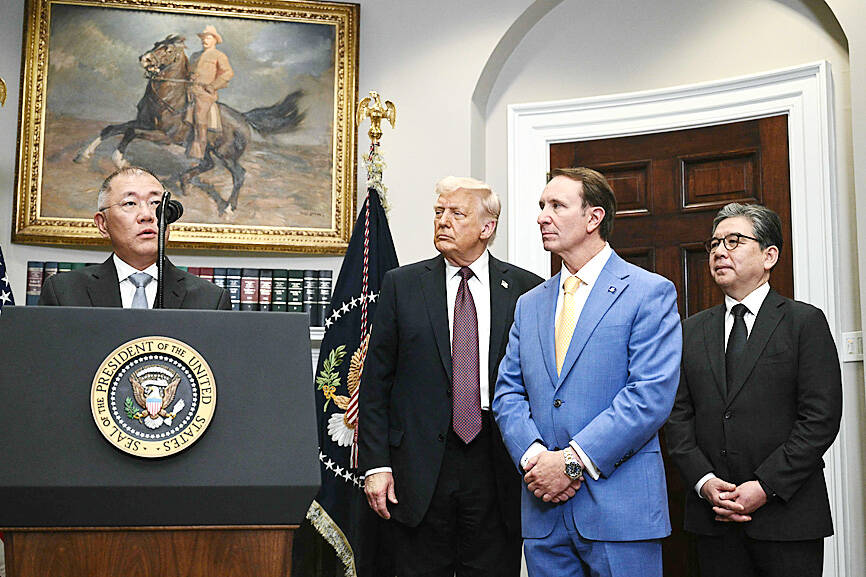US President Donald Trump on Monday announced steep tariffs on imports from countries buying Venezuelan oil and gas, a punitive measure that could hit China and India, among others.
The across-the-board 25 percent levies targeting direct and indirect buyers of Venezuelan oil can take effect as soon as Wednesday next week, according to an order signed by Trump, who accused Venezuela of “purposefully and deceitfully” sending “undercover, tens of thousands of high level, and other, criminals” to the US.
The 25 percent tariff would be on top of existing rates, he said.

Photo: AFP
China is the largest importer of Venezuelan oil, while other buyers include India, Spain and the US itself.
Caracas called the measure a “new aggression” by Washington.
“They can sanction and impose tariffs on whatever they want, what they cannot sanction is the love and patriotism of the Venezuelan people,” Venezuelan President Nicolas Maduro said during an event broadcast on radio and television.
China yesterday accused Washington of “interfering in Venezuela’s internal affairs.”
The US must “abolish the illegal unilateral sanctions,” Chinese Ministry of Foreign Affairs spokesman Guo Jiakun (郭嘉昆) told a news conference in Beijing.
Trump has dubbed Wednesday next week “liberation day” for the world’s biggest economy, already promising reciprocal tariffs tailored to each trading partner in an effort to remedy practices that Washington deems unfair.
He earlier signaled sector-specific duties to start on the same day — but the White House on Monday said that it might take a narrower approach.
Sector-specific tariffs “may or may not happen April 2,” a White House official told reporters, adding that the situation is “still fluid.”
The official reaffirmed that reciprocal tariffs would take place.
Trump told reporters on Monday that he might “give a lot of countries breaks” eventually, without elaborating.
He separately added that he would announce car tariffs “very shortly” and those on pharmaceuticals later down the line.
Separately, South Korean auto giant Hyundai Motor Co on Monday announced a multibillion-dollar investment in the US, including a new US$5.8 billion steel plant.
The plant, which is to be based in Louisiana, “will create 1,300 American jobs,” Hyundai executive chairman Euisun Chung told reporters at a White House event alongside Trump.
The move would also serve “as the foundation for a more self-reliant and secure automotive supply chain in the US,” Chung said.
Hyundai’s announcement makes it the latest firm to announce plans to invest billions of dollars into the US since Trump’s return to office in January.
“Cars are coming to this country at levels never seen before,” Trump told reporters on Monday.
The investment was “a clear demonstration that tariffs very strongly work,” he said.
“Hyundai will be producing steel in America and making its cars in America, and as a result, they’ll not have to pay any tariffs,” Trump added.

TAKING STOCK: A Taiwanese cookware firm in Vietnam urged customers to assess inventory or place orders early so shipments can reach the US while tariffs are paused Taiwanese businesses in Vietnam are exploring alternatives after the White House imposed a 46 percent import duty on Vietnamese goods, following US President Donald Trump’s announcement of “reciprocal” tariffs on the US’ trading partners. Lo Shih-liang (羅世良), chairman of Brico Industry Co (裕茂工業), a Taiwanese company that manufactures cast iron cookware and stove components in Vietnam, said that more than 40 percent of his business was tied to the US market, describing the constant US policy shifts as an emotional roller coaster. “I work during the day and stay up all night watching the news. I’ve been following US news until 3am

Six years ago, LVMH’s billionaire CEO Bernard Arnault and US President Donald Trump cut the blue ribbon on a factory in rural Texas that would make designer handbags for Louis Vuitton, one of the world’s best-known luxury brands. However, since the high-profile opening, the factory has faced a host of problems limiting production, 11 former Louis Vuitton employees said. The site has consistently ranked among the worst-performing for Louis Vuitton globally, “significantly” underperforming other facilities, said three former Louis Vuitton workers and a senior industry source, who cited internal rankings shared with staff. The plant’s problems — which have not

TARIFF CONCERNS: The chipmaker cited global uncertainty from US tariffs and a weakening economic outlook, but said its Singapore expansion remains on track Vanguard International Semiconductor Corp (世界先進), a foundry service provider specializing in producing power management and display driver chips, yesterday withdrew its full-year revenue projection of moderate growth for this year, as escalating US tariff tensions raised uncertainty and concern about a potential economic recession. The Hsinchu-based chipmaker in February said revenues this year would grow mildly from last year based on improving supply chain inventory levels and market demand. At the time, it also anticipated gradual quarter revenue growth. However, the US’ sweeping tariff policy has upended the industry’s supply chains and weakened economic prospects for the world economy, it said. “Now

COLLABORATION: Given Taiwan’s key position in global supply chains, the US firm is discussing strategies with local partners and clients to deal with global uncertainties Advanced Micro Devices Inc (AMD) yesterday said it is meeting with local ecosystem partners, including Taiwan Semiconductor Manufacturing Co (TSMC, 台積電), to discuss strategies, including long-term manufacturing, to navigate uncertainties such as US tariffs, as Taiwan occupies an important position in global supply chains. AMD chief executive officer Lisa Su (蘇姿丰) told reporters that Taiwan is an important part of the chip designer’s ecosystem and she is discussing with partners and customers in Taiwan to forge strong collaborations on different areas during this critical period. AMD has just become the first artificial-intelligence (AI) server chip customer of TSMC to utilize its advanced